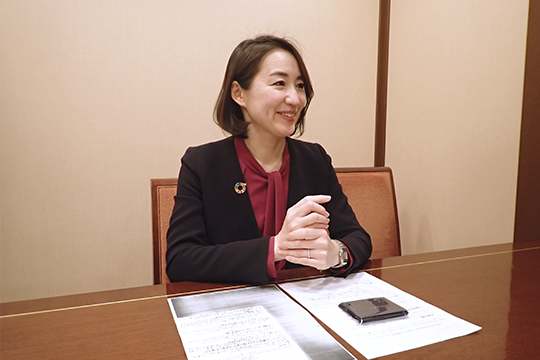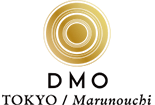SUSTAINABILITY
Interview
Layering innovation over tradition
Taking on the challenge of food sustainability
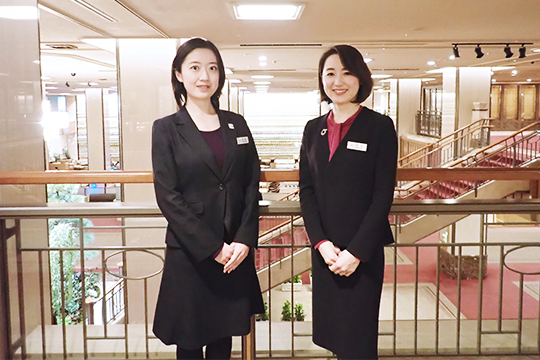
Keiko Takahashi (Left)
Assistant Manager,
Marketing Department, Imperial Hotel, Tokyo
Assistant Manager,
Marketing Department, Imperial Hotel, Tokyo
Rina Hiraishi (Right)
Manager, Marketing and Planning
Restaurant Department, Imperial Hotel, Tokyo
Manager, Marketing and Planning
Restaurant Department, Imperial Hotel, Tokyo
Imperial Hotel, Tokyo began life as Japan's guest house for visiting dignitaries more than 130 years ago. When they celebrated their 130th anniversary in 2020, they chose “More Imperial than ever,” as their commemorative slogan to express the way they are constantly evolving on a foundation of tradition to lead the industry in food sustainability and environmental response. To find out more about their unique initiatives, we talked to innovators in both the restaurant department, which welcomes many customers through their doors on a daily basis, and the corporate sales department catering to MICE needs.
Responding to changing customer expectations in an evolving world
――
At Imperial Hotel Tokyo, you began proactively introducing environmental initiatives early, creating your Environmental Committee back in 2001. What was the thinking behind this?
Hiraishi
Imperial Hotel Tokyo's first chairman was philanthropist Eiichi Shibusawa, a man who was deeply invested in social projects, meaning that his spirit of working for the good of society has been in our corporate DNA. I think this DNA is manifested in the way we sort trash carefully, participate in local initiatives to sprinkle water on the pavement (thereby lowering temperatures in summer), and have introduced Rainforest Alliance Certified coffee as the first hotel in Japan. Reaching our 130-year milestone provided an opportunity to reflect on whether we can do more in our core business to balance sustainability and the luxury services expected of a hotel.
Takahashi
It was in April 2020 that we established the Sustainability Management Committee to replace our Environmental Committee. This was partly to enable us to actualize our initiatives in alignment with the 2030 Agenda for Sustainable Development. Here in the corporate sales department, we've noticed a change in our customers' values with respect to the SDGs over the last few years, with selection as a MICE venue now often conditional on SDG implementation efforts.
In 2020, we surveyed customers on how important implementation of SDGs is when selecting a venue for events or dinners. Approximately 30% of companies responded, "very important," and a further 60% or so selected "it's not essential but it is important." This means that a total of 90% or more respondents are conscious of the SDGs. This figure is larger than I expected
In 2020, we surveyed customers on how important implementation of SDGs is when selecting a venue for events or dinners. Approximately 30% of companies responded, "very important," and a further 60% or so selected "it's not essential but it is important." This means that a total of 90% or more respondents are conscious of the SDGs. This figure is larger than I expected
Hiraishi
Even in the restaurant, we often sense how the world is changing. In December last year, we held a parent and child event themed around food and nutrition education. Here we introduced cooking methods that enable use of every part of an ingredient in cooking and held tasting sessions, and I was surprised by the huge number of children who took knowledge of SDGs for granted. In-house too, I've noticed that the younger the staff member, the more passionate they are about food waste issues and the more aware they are of sustainability.

Cutting food waste seen in the conventional buffet restaurant
――
I hear you're carrying out all kinds of creative initiatives for food sustainability.
Hiraishi
Among the food and nutrition education events I mentioned earlier was one called "A Tasting and Set-menu Lunch with Head Chef Sugimoto." The lunch menu that accompanies the table manner instruction makes deliberate use of items like sustainably farmed seafood, vegetables considered substandard due to variations in size and shape that don't make them onto shelves, and the piece of bread dough that always seems to be surplus to the recipe. Realizing that it was possible to make these kinds of dishes without compromising on flavor one bit was an eye-opener for us too, and has opened up a range of possibilities for the future.
We've also begun offering a new dinner plan called Intimate, serving up head chef Sugimoto's prix-fixe menus in private rooms in the main restaurant. For this, we create a customized menu for each diner who makes a reservation, allowing us to tailor it to special dinners or entertaining needs themed on sustainability.
We've also begun offering a new dinner plan called Intimate, serving up head chef Sugimoto's prix-fixe menus in private rooms in the main restaurant. For this, we create a customized menu for each diner who makes a reservation, allowing us to tailor it to special dinners or entertaining needs themed on sustainability.
Takahashi
I find corporate clients booking for MICE activities have a particularly strong interest in food waste measures. Back in 2007 we began using "environmentally-recycled vegetables," partnering with a company that takes food scraps generated by our restaurants and banquet rooms and uses these as fertilizer for growing vegetables that we then purchase. If the event organizer wishes, we can provide a menu utilizing these vegetables, not only for our restaurant but also our banquet meals.
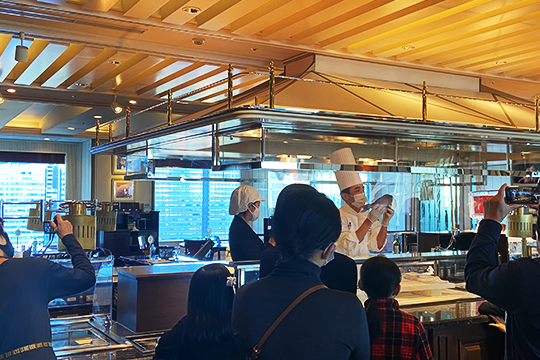
Food and nutrition education event by Head Chef Sugimoto
Photo provided by the Imperial Hotel, Tokyo
Photo provided by the Imperial Hotel, Tokyo
――
In terms of food waste measures, I hear the Imperial Hotel Tokyo has revolutionized buffet dining—a style you are credited with introducing to Japan many years ago.
Hiraishi
When we reopened the Imperial Viking Sal (our smorgasbord restaurant) after a temporary closure due to COVID-19, we introduced a made-to-order buffet style. In this type of buffet, each table is provided with a tablet, and diners can order their favorite dishes. These dishes are then prepared and brought to the table. This new provision method has led to a reduction in food waste in our buffet—something that has long been an issue, even for us. It has also had flow-on effects—our customers are telling us that our dishes are more delicious than ever thanks to being plated individually and served up straight away. Plus, customers communicate with staff when the dishes are brought to the table, and from there we see an increase in customers who support our initiative, making it truly "a three-way satisfaction".
Takahashi
This made-to-order buffet style, where menu items are prepared on demand, is also being introduced in some dishes that are part of our cocktail buffet such as the teppanyaki grill, sushi, and roast beef. Not only have we received favorable reviews for serving dishes prepared by chefs right in front of our customers' eyes, but I also think it's a great example of food waste reduction. In 2020, we began plating single serves and placing them on the buffet tables as an infection control measure, and this effectively led to a reduction in waste, so we plan to continue with this.
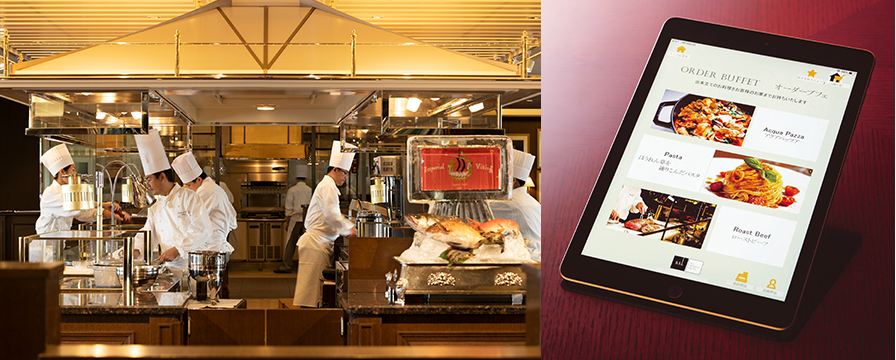
Imperial Viking Sal
Photo provided by the Imperial Hotel, Tokyo
Photo provided by the Imperial Hotel, Tokyo
Providing options to achieve environmentally friendly MICE
――
With your initiatives, is there anything that has proved particularly difficult or required ingenuity?
Hiraishi
Introducing the made-to-order buffet required a huge shift in mindset for our staff. As might be expected with large numbers of experienced staff, the existing style was deeply ingrained, and there were many comments that showed trepidation such as, "Do you really think our customers will understand this method?" or "Using a tablet just isn't very us, is it?" When we started up, the head chef gathered together all of the 130-odd staff and asked them to act as if the restaurant had been reborn as a completely different place. I think that this was the turning point for changing the mindset of our staff. Perhaps the head chef was convinced that serving up delicious dishes was at our essence, and provided we didn't diverge from that, our customers would definitely still rate us even if the provision method changed.
Takahashi
With MICE, there's the constant question of how to reduce food waste as a hotel, while still working closely with the wishes of hosts preoccupied with hospitality for their guests. I sometimes find that aspect difficult. I think the most important thing with food waste measures in banquet cocktail buffet style events is ascertaining in advance the attributes and characteristics of participants, and the aim of the event. Naturally, we look at factors like the ratio of men to women and age groups, and if we've hosted the event before we carry out a detailed check of points like what was popular and how much they ate, and then we share the details in house. Moreover, by checking how much of what food was left over at the end of each banquet, and collating and using this statistical data successfully, I believe we can deliver menus that delight hosts and participants alike, and also result in food waste reductions.
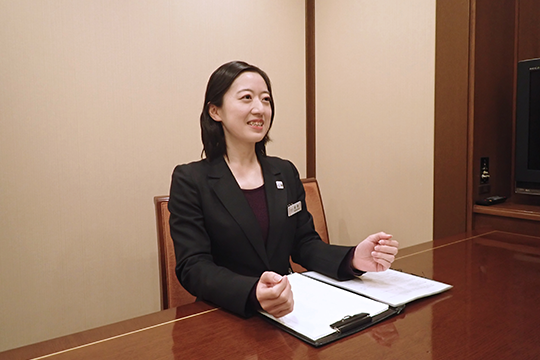
――
Please tell me about any initiatives, other than food-based ones, that you are currently working on.
Takahashi
Many companies are extremely interested in the energy used in our venues, and if they request it, we can arrange for them to purchase green energy collected from renewable energy sources that do not emit CO2. Hosts can also advertise their stance to participants by displaying a green energy certificate on websites and at the venue, stating that the energy used for their event is covered by renewable energy. Our hotel also uses green energy for our Christmas illuminations and various events we hold here.
Hiraishi
Another example is our Eco-Monday initiative which we host every Monday in the Imperial Viking Sal buffet restaurant mentioned above. On those days we use green energy for things like the lighting and air-conditioning in the restaurant, and customers who dine with us are eligible for a special offer (based on a seasonal theme) such as the gift of an eco-friendly bag that becomes a pocket square, or a complimentary sustainable drink, making it a participatory environmental activity for our customers.
Takahashi
As a measure to combat marine plastic waste we offer options that let seminar hosts substitute plastic bottles with mineral-water cartons and suggest decorations and panels that don't generate waste. A partner company constructs these by combining lightweight aluminum frame with fabric, almost all of which is reused or recycled, allowing us to heavily reduce the amount of post-event waste. Since these decorations and panels also take less time to assemble, it has the effect of helping reduce the amount of energy used in setting up. I believe it is important to have a range of different options available for customers who are hosting events.

Marunouchi area—leading the conversation
――
What direction do you want to pursue in terms of sustainability?
Takahashi
I've been noticing a growing trend toward reshoring in the food industry, motivated in part by COVID-19. We are currently preparing to push the merits of proactive use of domestically grown ingredients—merits that include supporting domestic producers, keeping transport energy consumption down, and ensuring food safety and security. We'd like to build up a conversation with our customers about this as we explore a wide range of possibilities.
Hiraishi
Sustainability initiatives take time to implement, so we're focused on working steadily to complete the tasks in front of us. It has given us a sense of confidence being able to create a success story like the made-to-order buffet in a hotel like ours, where providing delicious dishes and luxury services are our main focus, and compromising on this is unthinkable. As a company, we should be aiming for business that generates "a three-way satisfaction". This means running our business in a way that generates a solid profit for our own company, while also satisfying the customers and producing good results for society and the environment. Perhaps the SDGs are less of an objective and more of a tool to help us all orient ourselves so we’re heading in the same direction. It would be wonderful if our initiatives generated communication with customers and other people in the area and created a sense of common purpose.
Takahashi
Many of Japan's top companies and venues are clustered in the Marunouchi area where we're located, and I think that this area has a particularly strong awareness of the SDGs, even for Tokyo. If the Marunouchi area gets moving, it will no doubt have a big enough impact to change all of Japan. We are definitely not a large company, but we take pride in the fact that we have long been a leader in the hotel industry. The fact that Imperial Hotel Tokyo is working on sustainability will send a strong message, and we hope to lead the industry in this field too.
